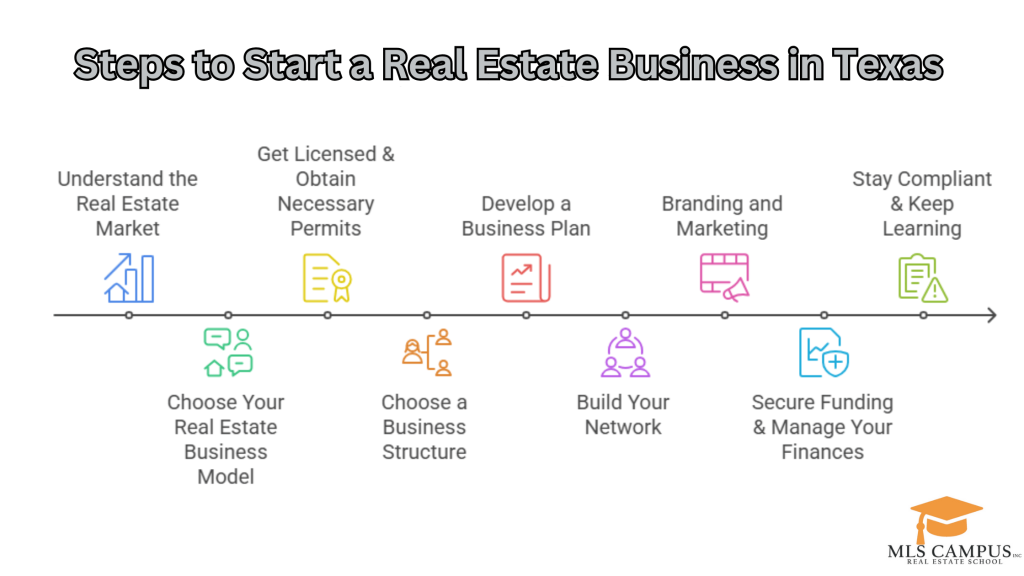Starting a Real Estate Business in Texas: A Beginners Guide

Did you know Texas is home to over 225,000 real estate professionals—and growing? With no state income tax, a thriving job market, and soaring housing demand, Texas offers one of the best opportunities to launch a real estate business. Whether you want to become a real estate agent, investor, property manager, or developer, this step-by-step guide will help you build and scale a successful real estate business.
Why Texas?
Texas isn’t just growing—it’s booming with opportunities for real estate professionals, and for good reason:
- Explosive Job Growth – Major cities like Austin, Dallas, Houston, and San Antonio attract businesses and new residents, fueling housing demand.
- Massive Population Growth – Thousands relocate to Texas monthly, increasing demand for homes, rentals, and commercial spaces.
- No State Income Tax – Entrepreneurs and investors keep more of their earnings, making Texas a top destination for real estate ventures.
- Diverse Market Opportunities – Whether it’s residential sales, commercial investments, or property management, Texas offers multiple pathways to success.
If you’re wondering, “Is Texas a good place to invest in real estate in 2025?” the answer is a YES!
For a deeper dive, check out our blog: Is Texas Good to Invest in Real Estate?
Quick Start Guide
Here’s a step-by-step roadmap to starting your real estate business in Texas:
🔹 Step 1: Understand the Real Estate Market
🔹 Step 2: Choose Your Real Estate Business Model
🔹 Step 3: Get Licensed & Obtain Necessary Permits (If Required)
🔹 Step 4: Choose a Business Structure
🔹 Step 5: Develop a Business Plan
🔹 Step 6: Build Your Network
🔹 Step 7: Branding and Marketing
🔹 Step 8: Secure Funding & Manage Your Finances
🔹 Step 9: Stay Compliant & Keep Learning
🔹 Step 10: Evaluate and Scale Your Business
Let’s dive into each step!
Step 1: Understand the Real Estate Market
Success in real estate starts with market research. Texas has different real estate trends by region, so understanding your local market is critical.
- Current Market Trends in Texas:
- Sustainable Development – Eco-friendly homes are in demand.
- Technology-Driven Transactions – Virtual tours & AI-driven market insights.
- Suburban Expansion – Remote work is fueling suburban real estate growth.
Action Step: Research your target market and identify profitable opportunities.
Step 2: Choose Your Real Estate Business Model
Real estate is a diverse industry, and specializing in a specific niche can enhance your chances of success. Ranch sales are a significant and lucrative specialization in Texas due to the state’s vast rural properties. Choosing a niche that aligns with your strengths and market demand can set you on the right path.
- Residential Real Estate:
- Buy, sell, or lease single-family homes, condos, and multifamily units.
- Commercial Real Estate:
- Handle leasing and sales of office buildings, retail spaces, and industrial properties.
- Industrial Real Estate:
- Managing warehouses, distribution centers, and manufacturing facilities.
- Real Estate Investing:
- Fix-and-Flip: Buy undervalued properties, renovate, and resell at a profit.
- Buy-and-Hold: Purchase rental properties for long-term passive income.
- Wholesaling: Secure properties under contract and sell them to investors.
- Property Management:
- Manage rental properties for landlords, handling tenants, maintenance, and financials.
- Real Estate Development:
- Acquire land, develop residential or commercial properties, and sell or lease them.
Step 3: Get Licensed & Obtain Necessary Permits (If Required)
If you plan to work as a real estate agent, broker, or property manager, you must obtain a license through the Texas Real Estate Commission (TREC).
- Texas Real Estate Agent License
- Be at least 18 years old and a U.S. citizen or legal resident.
- Complete 180 hours of real estate education.
- Pass the state licensing exam.
- Work under a sponsoring broker.
- Texas Real Estate Broker License
- Have four years of active agent experience.
- Complete 900 hours of real estate education.
- Pass the Texas Broker Exam.
- Register your brokerage firm with TREC.
- Additional Licensing & Permits
- Property Managers – May require a real estate license.
- Investors & Developers – No license is needed, but zoning and building permits may apply.
🔥 Good news: Investors don’t need a real estate license, but understanding Texas property laws is crucial!
Step 4: Choose a Business Structure
Selecting the proper legal structure for your real estate venture is a key strategic decision. The entity you choose affects your taxes, liability, and operations. Below are common structures to consider and factors to guide your decision.
- Sole Proprietorship: Simple to start but offers no liability protection.
- Limited Liability Company (LLC): Offers legal protection and tax flexibility.
- S-Corporation (S-Corp): Helps avoid double taxation while allowing profit distribution to shareholders.
Requirements: Register your business with the Texas Secretary of State and obtain an Employer Identification Number (EIN) from the IRS.
1. How to Register Your Business in Texas?
After selecting your preferred business structure, follow these steps to officially register your company:
- Choose a Business Name: Select a unique business name that meets Texas naming requirements. Verify its availability through a name search on the Texas Secretary of State website. If you plan to operate under a different name than your legal business name, register a DBA (Doing Business As).
- Obtain an Employer Identification Number (EIN): Apply for an EIN through the IRS website for tax purposes, hiring employees, and opening business bank accounts.
- Register with the State: File your chosen business structure (LLC, S-Corp, etc.) with the Texas Secretary of State.
- Obtain Necessary Permits: Depending on your niche, you may need additional business licenses.
Action Step: Register your business and set up a separate business bank account.
Step 5: Develop a Business Plan
A strong business plan provides direction and helps secure funding. It should include:
- Mission & Vision: Define your business’s purpose and long-term objectives.
- Market Analysis: Research local market conditions, target clients, and competitors.
- Services Offered: Determine your focus—residential sales, commercial leasing, property management, or development.
- Financial Projections: Estimate your initial costs, ongoing expenses, and potential revenue.
- Legal & Operational Structure: Decide on your business entity (Sole Proprietorship, LLC, S-Corp) and set up essential legal documents.
Action Step: Use a template from SBA.gov to create a business plan.
Step 6: Build Your Network
Your professional connections are essential for business growth. Take these steps to expand your network:
- Join Industry Associations: Become a member of the Texas Association of Realtors (TAR) or your local board of Realtors for training and networking.
- Attend Real Estate Events: Participate in meetups, conferences, and investment clubs to connect with other professionals.
- Build Referral Partnerships: Establish relationships with mortgage lenders, contractors, appraisers, and real estate attorneys to strengthen your referral
Step 7: Branding and Marketing
- How to Stand Out in the Market:
- Brand Identity: Create a professional logo, website, and social media presence with consistent branding elements (colors, fonts, messaging).
- Marketing Strategy:
- Website & SEO: Develop a professional website optimized for search engines.
- Content & social media: Publish blog posts, engage on platforms like Instagram, LinkedIn, and TikTok, and leverage paid ads to reach local buyers and sellers.
- Client Engagement: Email marketing and digital advertising build relationships and retain clients.
- Setting Up Your Office & Choosing the Right Tools
- Office Setup:
- Home Office – Cost-effective and convenient.
- Virtual Office – Enhances professionalism without the overhead.
- Physical Office – Best for brokerages or teams.
- Essential Business Tools:
- CRM System – Manage leads and client interactions.
- MLS Access – Essential for property listings.
- Digital Marketing Tools – SEO, email marketing, and social media automation.
Step 8: Secure Funding and Manage Your Finances
Depending on your business model, you may need funding for property purchases, marketing, or office setup.
Funding Options:
- Personal Savings: Ideal for self-funded startups.
- Bank Loans & SBA Loans: Good for more significant investments.
- Private Investors & Crowdfunding: Secure capital for real estate projects.
Financial Management:
- Use accounting software (QuickBooks, Xero) to track income and expenses.
- Set aside an emergency fund for market fluctuations.
- Hire a real estate accountant to optimize tax benefits.
Action Step: Choose the best funding option for your business and set up financial tracking systems
Step 9: Stay Compliant & Keep Learning
Texas real estate laws and market conditions evolve constantly, making ongoing education essential. Stay compliant by completing continuing education courses required by the Texas Real Estate Commission (TREC) to maintain your license. Stay informed on local zoning laws, property management regulations, and market trends to avoid legal risks and make informed decisions. Join real estate forums, mentorship programs, and networking groups to gain insights and professional support. Lastly, consider finding a mentor who understands the Texas market and can help you navigate industry changes effectively.
Step 10: Evaluate and Scale Your Business
Once your business is up and running, periodic evaluations will help identify areas for improvement. Consider setting quarterly or annual goals to ensure you’re meeting your business objectives.
- Ways to Scale Your Business:
- Hire Support Staff: As business picks up, hiring an assistant or transaction coordinator can allow you to focus more on clients and less on paperwork.
- Invest in New Technologies: From virtual tours to automated marketing platforms, adopting new technology can streamline operations and enhance client experience.
- Expand Your Services: Once established, diversify your services by adding property management, investment, or commercial real estate.
Final Thoughts
Building a successful real estate business in Texas is an exciting journey that starts with a single step. Whether you’re aiming to become an agent, investor, property manager, or developer, success comes from making informed decisions, staying persistent, and continuously learning.
Every top real estate professional once stood where you are now—at the starting line. The difference? They took action.
📌 Now it’s your turn! What’s your biggest question about starting a real estate business in Texas? MLS Campus is here to guide you every step of the way.
Ready to Launch Your Real Estate Business in Texas? Let MLS Campus Help!
Want to kickstart your Texas real estate career? MLS Campus is here to guide you every step of the way with TREC-approved real estate courses designed to help you get licensed and start investing with confidence.
Why Choose MLS Campus?
✔ Easy-to-Follow Courses – Learn everything you need to know about Texas real estate.
✔ TREC-Approved Curriculum – Get your license the right way.
✔ Support Every Step of the Way – Our team is here to help you succeed.
30 Days Limited Money Back Guarantee Policy
If you decide you’re not 100% satisfied within the First 30 Days of your initial purchase, simply contact us by email and request a cancellation and full refund. You will receive a full refund of your purchase price. If the final exam has been taken, a refund can not be issued. The Real Estate Exam Prep Master and the Exam Prep Math, if purchased separately are not refundable.
Course Duration
The course is active for six months from the date of purchase. We offer the 7th month for free if needed. If your course has been active for 7 months or more, you can purchase one-month extensions. It is possible to have the course extended by up to one year by purchasing monthly extensions online.
Customer Support: Call us at (877) 331-6235 or Contact us by Email
If we can assist you with Technical Support, General License Inquiries or Questions about Course Material please contact us.
Questions about course material: An Instructor is available Monday through Friday a week from 9 am to 7 pm (EST)
Technical Support or any other questions: Our office staff are available Monday through Friday a week from 9 am to 7 pm (EST)
We do our best to reply promptly to emails on Weekends
*Except for Major Holidays
Join Over 100,000 Students Enroll With MLS Campus now
Become Part of MLS Campus School to Further Your Career.












